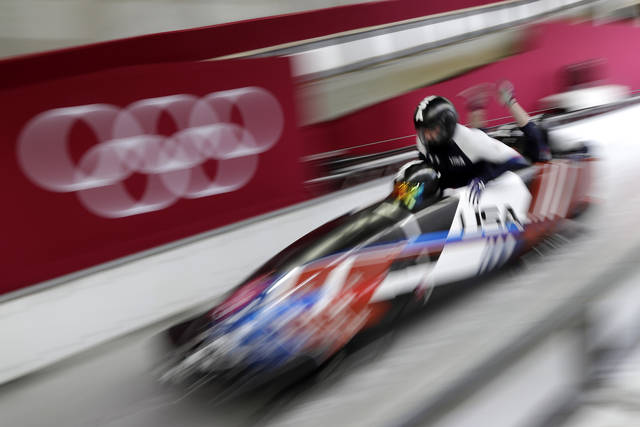PYEONGCHANG, South Korea — The last official day of bobsled season is Sunday, and the American men probably can’t wait for the finale.
So far in these Pyeongchang Olympics, U.S. bobsled coach Brian Shimer was bedridden by illness, Codie Bascue partially tore his left calf muscle, Justin Olsen needed emergency surgery to remove his appendix and Nick Cunningham saw whatever medal hopes he had in the two-man race end about five seconds from the starting line.
That’s not even a complete list of the problems.
“The bobsled Gods are upset at us for something,” Cunningham said.
That’s about the only explanation that makes sense. Barring some miracle Sunday, the U.S. men are going home without an Olympic bobsled medal for the first time in 12 years. It’s not even certain if they’ll have a sled finish in the top 10 of either the two- or four-man race; Bascue was ninth going into Sunday’s final two heats of four-man.
“We’re going to continue to fight,” said Cunningham, who struggled with the start of the track in the two-man race and wound up 21st. “You’re not going to hold us down here. We’re going to keep our heads held high, regardless of where we finish, just based on our performance and we know how hard we’re fighting.”
That there’s any fight left is somewhat impressive, given the events of this season.
The Olympic year started with the death of driver Steven Holcomb, followed by Shimer’s home in southwest Florida getting clobbered by a massive hurricane, followed by the doping suspension of Olympic-hopeful Ryan Bailey over something team officials believe was inadvertent, followed by sleds getting lost in a shipping debacle on their way to Germany before a World Cup race, followed by no World Cup medals on foreign soil … well, you get the idea.
A rough 2017-18 campaign is coming to a merciful end. And all three pilots are dealing with something; Bascue is limping to the finish after getting hurt in the two-man race, Olsen is still sore from his surgery earlier this month and Cunningham is trying hard to not let frustrations overpower his Olympic experience.
“We’re all still pretty positive,” Olympic rookie push athlete Sam Michener said. “We executed well as a team. A lot of it, chalk it up to bobsled. It’s a crazy sport. Sometimes you’re fast, sometimes you’re not.”
Not having Holcomb has clearly been an enormous problem for the U.S. all season. He was the best driver on the team and probably the best driver on the planet, but he was also the glue of the organization. Holcomb always made sure other U.S. sleds had everything in line. He was a mentor to the younger drivers, plus an unofficial assistant coach.
Without him, there was no way the U.S. was going to be at its best in Pyeongchang. But the Americans — even with a young team, with the majority of the men’s bobsledders in Pyeongchang being Olympic rookies — expected more than this.
“We just couldn’t put it together,” Cunningham said.
———
More AP Olympic coverage: https://wintergames.ap.org


